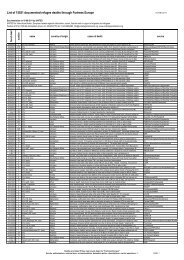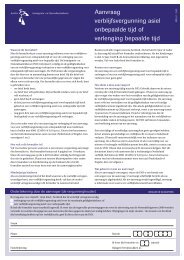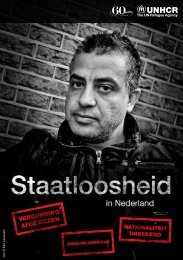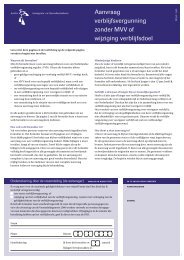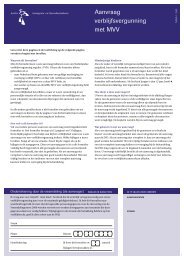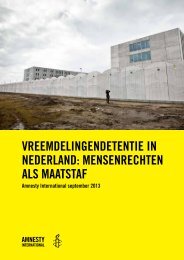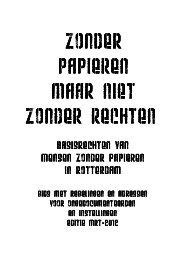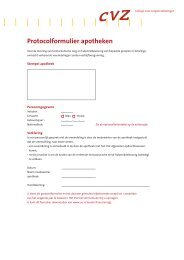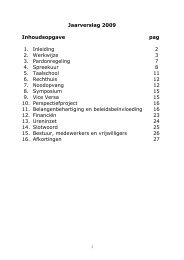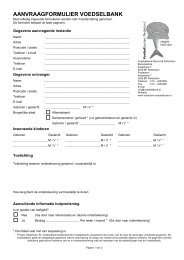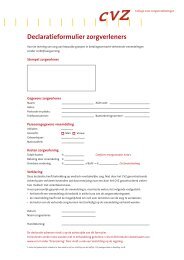Handboek voor begeleiders van vluchtelingen en ... - Stichting ROS
Handboek voor begeleiders van vluchtelingen en ... - Stichting ROS
Handboek voor begeleiders van vluchtelingen en ... - Stichting ROS
Create successful ePaper yourself
Turn your PDF publications into a flip-book with our unique Google optimized e-Paper software.
considered under an admissibility or pre-scre<strong>en</strong>ing procedure as well as those who are<br />
being considered under refugee status determination procedures. It also includes those<br />
exercising their right to seek judicial and/or administrative review of their asylum<br />
request.<br />
5. Asylum-seekers are <strong>en</strong>titled to b<strong>en</strong>efit from the protection afforded by various<br />
International and Regional Human Rights instrum<strong>en</strong>ts, which set out the basic<br />
standards and norms of treatm<strong>en</strong>t. Whereas each State has a right to control those<br />
<strong>en</strong>tering into their territory, these rights must be exercised in accordance with a<br />
prescribed law, which is accessible and formulated with suffici<strong>en</strong>t precision for the<br />
regulation of individual conduct. For det<strong>en</strong>tion of asylum-seekers to be lawful and not<br />
arbitrary, it must comply not only with the applicable national law, but with Article 31<br />
of the Conv<strong>en</strong>tion and international law. It must be exercised in a non-discriminatory<br />
manner and must be subject to judicial or administrative review to <strong>en</strong>sure that it<br />
continues to be necessary in the circumstances, with the possibility of release where no<br />
grounds for its continuation exist. .3<br />
6. Although these guidelines deal specifically with the det<strong>en</strong>tion of asylum-seekers the<br />
issue of the det<strong>en</strong>tion of stateless persons needs to be highlighted. 4 While the majority<br />
of stateless persons are not asylum-seekers, a paragraph on the det<strong>en</strong>tion of stateless<br />
persons is included in these guidelines in recognition of UNHCR’s formal<br />
responsibilities for this group and also because the basic standards and norms of<br />
treatm<strong>en</strong>t contained in international human rights instrum<strong>en</strong>ts applicable to detainees<br />
g<strong>en</strong>erally should be applied to both asylum-seekers and stateless persons. The inability<br />
of stateless persons who have left their countries of habitual resid<strong>en</strong>ce to return to<br />
them, has be<strong>en</strong> a reason for unduly prolonged or arbitrary det<strong>en</strong>tion of these persons in<br />
third countries. Similarly, individuals whom the State of nationality refuses to accept<br />
back on the basis that nationality was withdrawn or lost while they were out of the<br />
country, or who are not acknowledged as nationals without proof of nationality, which<br />
in the circumstances is difficult to acquire, have also be<strong>en</strong> held in prolonged or<br />
indefinite det<strong>en</strong>tion only because the question of where to s<strong>en</strong>d them remains<br />
unresolved.<br />
Guideline 1: Scope of the Guidelines.<br />
These guidelines apply to all asylum-seekers who are being considered for, or who are in,<br />
det<strong>en</strong>tion or det<strong>en</strong>tion-like situations. For the purpose of these guidelines, UNHCR considers<br />
det<strong>en</strong>tion as: confinem<strong>en</strong>t within a narrowly bounded or restricted location, including prisons,<br />
closed camps, det<strong>en</strong>tion facilities or airport transit zones, where freedom of movem<strong>en</strong>t is<br />
substantially curtailed, and where the only opportunity to leave this limited area is to leave the<br />
territory. There is a qualitative differ<strong>en</strong>ce betwe<strong>en</strong> det<strong>en</strong>tion and other restrictions on freedom<br />
of movem<strong>en</strong>t.<br />
Persons who are subject to limitations on domicile and resid<strong>en</strong>cy are not g<strong>en</strong>erally considered<br />
to be in det<strong>en</strong>tion.<br />
Wh<strong>en</strong> considering whether an asylum-seeker is in det<strong>en</strong>tion, the cumulative impact of the<br />
restrictions as well as the degree and int<strong>en</strong>sity of each of them should also be assessed.<br />
73




